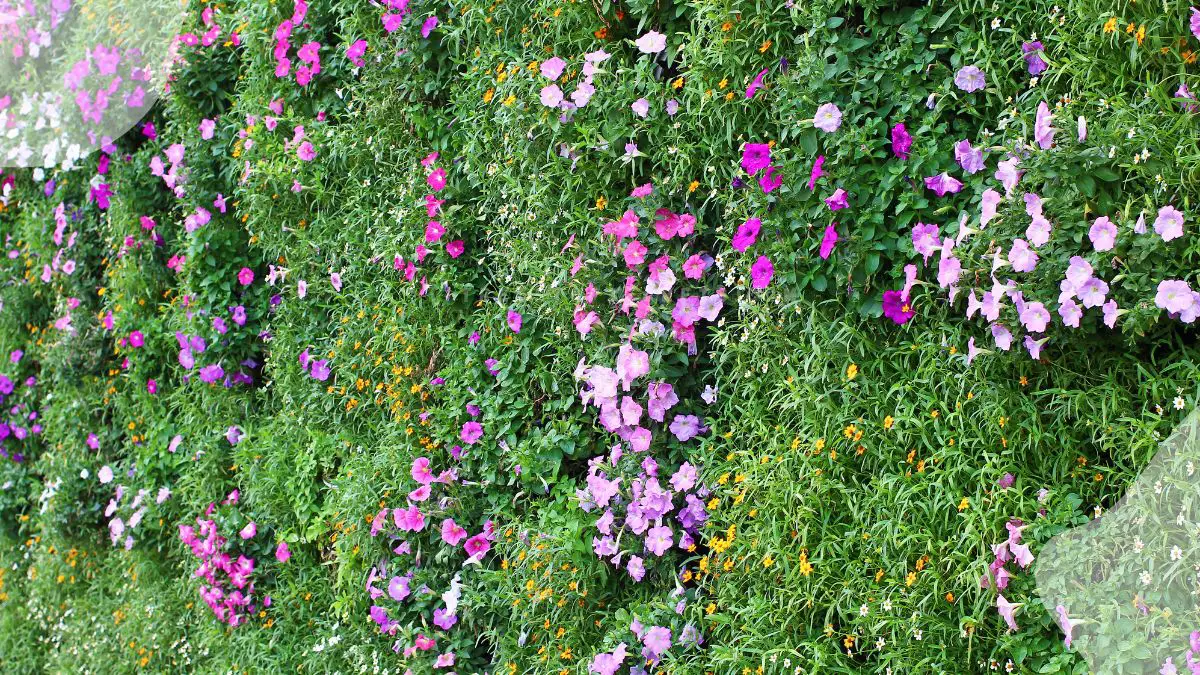Creating a beautiful flower wall might seem daunting, but with the right guidance, anyone can do it. In this guide, I’ll show you how to build a flower wall step-by-step. Whether you're a seasoned gardener or a beginner, you'll find this project manageable and rewarding. With a few basic materials like wood panel and some creativity, you’ll soon have a stunning flower wall that enhances any space.
To build a flower wall, start by selecting a sturdy wood frame or trellis panel. Attach a wire mesh to the frame, then add a layer of landscaping fabric. This will hold the soil and flowers in place. Choose your plants based on the light and water conditions of the location. Fill the pockets with soil, plant your flowers, and water them regularly. Maintain the wall by trimming and fertilizing the plants as needed to keep them healthy and vibrant.
If you're eager to learn more, stay tuned! I have plenty of additional tips and tricks to ensure your flower wall flourishes, from selecting the right flowers to seasonal maintenance.
Key Takeaways
- Gather all the materials needed before starting the flower wall project.
- Prepare the workspace and tools for a smooth assembly process.
- Build a sturdy base structure to support the weight of the flowers.
- Add the flowers strategically, considering color combinations and placement.
- Set up the completed flower wall as a beautiful backdrop for events or decoration.
- Understand the costs involved in creating a flower wall for budget planning purposes.
Gathering Your Materials
Essential Tools
To attach hinges to plywood, use a power drill for secure fastening. Secure boxwood panels with a staple gun for stability. Trim excess materials easily with a pair of scissors.
Choosing Flowers
When embellishing the flower wall, opt for loose flowers or pre-made swags. Consider the color scheme and theme of the wall for a cohesive look. Choose flowers that complement the design aesthetically.
Wood Selection
Select plywood sheets of appropriate size for the flower wall construction. Consider factors like elevation and reusability when choosing the wood. Ensure the wood is suitable for outdoor use and storage conditions.
Preparing for Assembly
Workspace Setup
Create a designated area for assembling the flower wall. Ensure enough space for materials and tools. Organize everything for easy access.
Wood Preparation
Lay plywood boards side by side. Trim excess wood neatly before attaching hinges. Prepare the surface for securing boxwood panels.
Building the Base
Frame Assembly
To construct the base of the flower wall, attach hinges to plywood boards for convenient folding. Secure boxwood panels onto the boards using a staple gun. Ensure the frame is sturdy and well-constructed to support the weight of the flowers.
Backing Options
When building a flower wall, it's essential to explore different backing options. Consider using faux boxwood panels for a lush backdrop that adds a natural touch. Evaluate various backing materials for their durability and aesthetic appeal to enhance the overall look.
Adding the Flowers
Fresh vs Silk
Decide between fresh flowers and silk flowers for the wall. Consider longevity and maintenance requirements of each type. Evaluate the cost implications of using fresh versus silk flowers.
When choosing between fresh and silk flowers, fresh flowers provide a natural and fragrant touch to the flower wall. However, they require regular replacement due to wilting. On the other hand, silk flowers offer longevity and require minimal maintenance, making them a convenient option.
Consider the longevity factor when deciding on the flower type. Fresh flowers have a shorter lifespan compared to silk flowers, which can maintain their appearance for an extended period. For a long-term decorative solution, silk flowers might be the more practical choice.
Evaluate the maintenance requirements associated with fresh and silk flowers. Fresh flowers need watering, trimming, and monitoring for wilting, while silk flowers only require occasional dusting or cleaning to maintain their appearance. Factor in your availability for maintenance when making your decision.
Assess the cost implications of using fresh versus silk flowers for the flower wall. While fresh flowers provide a vibrant and natural look, they can be costly due to frequent replacements. Silk flowers may have a higher upfront cost but offer long-term savings as they do not need regular replacements.
Arrangement Tips
Arrange flowers in a visually appealing pattern on the wall. Create depth and texture by layering different flower types. Experiment with different arrangements before finalizing the design.
When arranging flowers on the wall, aim for a visually appealing pattern that complements the overall aesthetic of the space. Consider using a mix of colors, sizes, and shapes to create an eye-catching display that captures attention.
Create depth and texture by layering different types of flowers on the wall. By combining various flower varieties such as roses, lilies, and daisies, you can add dimension to the arrangement and make it more visually interesting.
Experiment with different arrangements before finalizing the design to find the most suitable layout for your flower wall. Try out various combinations of flowers and placements to see which arrangement best enhances the space and achieves the desired decorative effect.
Setting Up the Backdrop
Secure Mounting
To prevent sagging, ensure that flowers are securely attached to the backing. Use techniques like threading stems into the backing for a sturdy hold. Consider the weight of the flowers and opt for robust mounting methods to maintain stability.
Final Touches
Enhance the flower wall by adding embellishments like ribbons or other decorative elements. Step back to evaluate the overall look and make any necessary final adjustments. Check that all flowers are evenly distributed and firmly attached to create a cohesive and visually appealing backdrop.
Understanding Costs
Material Expenses
To build a flower wall, you need to calculate the costs of essential materials like plywood, hinges, screws, and boxwood panels. Don't forget to include the price of flowers and any extra embellishments. By totaling these expenses, you can get an accurate picture of the overall cost involved in constructing the flower wall.
When estimating the material expenses, it's crucial to account for all the components needed to create a sturdy and visually appealing flower wall. For instance, the quality and quantity of flowers will directly impact the final cost. Moreover, considering the durability and aesthetics of the materials used can help you determine the longevity and attractiveness of the finished product.
Pricing Strategies
Setting a competitive rental rate for your flower wall should be based on a thorough analysis of both material costs and labor involved in its construction. By understanding how much you've spent on materials and factoring in the time and effort put into building the wall, you can establish a pricing structure that ensures profitability while remaining attractive to potential customers.
In determining the pricing strategies, remember that the quality of your flower wall plays a significant role in justifying its price. Customers are willing to pay more for a well-constructed and visually appealing backdrop. Therefore, investing in high-quality materials and skilled labor can help you command a higher price point for your rentals. Consider offering package deals or discounts for clients who opt for multiple rentals, enticing them with cost-effective options.
Rental Insights
Rental Rates
Setting reasonable rental rates for flower walls involves calculating material and labor costs. Market demand and competitor pricing should also be factored in to ensure competitiveness. Adjust rates seasonally and for different types of events to maximize profitability.
When determining rental rates, it's essential to analyze the cost of materials such as flowers, greenery, and frames. Labor costs for assembly and disassembly should also be considered to ensure a fair pricing structure. By understanding these expenses, businesses can set rates that cover costs while generating profit.
To stay competitive, businesses should research market demand and analyze competitor pricing strategies. By offering attractive rates compared to competitors, businesses can attract more clients and secure bookings. Regularly monitoring market trends is crucial for adjusting rates to match demand fluctuations.
Seasonal variations play a significant role in rental pricing. Rates may vary depending on peak seasons like weddings or holidays when demand is high. Different event types such as corporate events or parties may warrant adjusted pricing structures to cater to specific client needs.
Silk Alternatives
Exploring silk flower options provides a cost-effective alternative to fresh flowers for building flower walls. Silk flowers offer a realistic appearance that closely resembles fresh blooms while providing increased durability for multiple uses.
Silk flowers present an opportunity for long-term savings as they can be reused for various events without wilting or losing their aesthetic appeal. Businesses can benefit from investing in silk flowers by reducing the need for frequent replacements, ultimately saving on procurement costs.
When considering silk alternatives, it's crucial to assess the quality and lifelike appearance of silk flowers. High-quality silk blooms can be indistinguishable from fresh flowers, enhancing the overall visual impact of flower walls. Evaluating the durability and maintenance requirements of silk flowers ensures longevity and cost-effectiveness for business operations.
Floral Themes
When creating a flower wall, brainstorm various theme ideas to bring it to life. Consider seasonal themes such as spring blossoms or winter wonderlands. For events, tailor the theme to match the occasion, like romantic roses for weddings or vibrant sunflowers for summer parties. Enhance the theme by incorporating elements like lush greenery or twinkling lights for added charm and elegance.
Final Remarks
You now have all the tools and knowledge to create a stunning flower wall that will be the highlight of any event. From gathering the materials to understanding costs and rental insights, you've covered every step needed to bring your floral vision to life. By following these steps, you can build a beautiful backdrop that fits your style and budget.
Now it's time to roll up your sleeves, gather your supplies, and start assembling your very own flower wall. Don't hesitate to unleash your creativity and make this project uniquely yours. Get ready to impress your guests with a gorgeous floral display that will leave everyone in awe!
Frequently Asked Questions
How do I gather the materials needed for building a flower wall?
To gather materials for a flower wall, you will need to collect artificial flowers, greenery, floral foam, wire cutters, and a sturdy base such as plywood or foam board. Ensure you have enough materials to cover the desired size of your flower wall.
How can I prepare for assembling a flower wall?
Prepare for assembling a flower wall by organizing your workspace, cutting the floral foam to fit the base, and prepping the artificial flowers by trimming stems to the desired length. Lay out all materials in an easily accessible manner to streamline the assembly process.
What is involved in building the base of a flower wall?
Building the base of a flower wall involves attaching the floral foam securely to the base material using adhesive or wire. Ensure the base is stable and can support the weight of the flowers and greenery. This step provides a foundation for arranging the flowers.
How should I go about adding the flowers to my flower wall?
When adding flowers to your wall, start from the bottom and work your way up, filling in any gaps with greenery for a lush look. Secure each stem into the floral foam using wire or hot glue. Mix and match colors and textures for an eye-catching display.
What are some popular floral themes I can consider for my flower wall?
Popular floral themes for a flower wall include romantic roses, vibrant tropical blooms, elegant white hydrangeas, rustic sunflowers, and whimsical wildflowers. Choose a theme that complements your event or space decor to create a cohesive and visually appealing display.
Image Source: Paid image from CANVA




